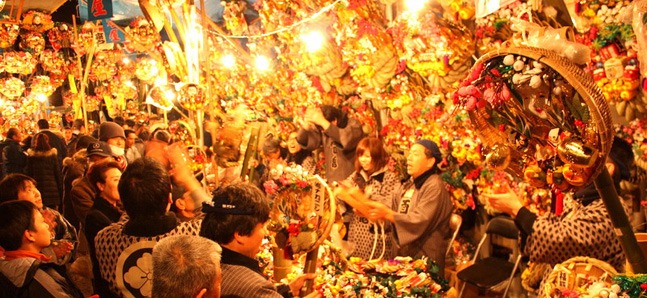
Posted: Tue Nov 24 2009
Although the days are now getting noticeably shorter and winter is beginning to bite, there are still plenty of festivals in Tokyo to help take the chill away— festivals where crowds raise their voices, lanterns illuminate shrines, and plenty of festive foods can be found. Everyone, Tokyoites and otherwise, will find something enthralling about the atmosphere that these festivals create.
Perhaps the most well known of these festivals is Tori-no-Ichi— a full-blown event signalling the arrival of winter. Taking place every November on the day of the rooster at both Chokoku-ji Temple and Otori Shrine, is a festival steeped in tradition. Here visitors will find an array of stalls selling Japanese kumade (elaborately decorated ornamental bamboo rakes) on sale for those who wish to rake in good luck and prosperity. Competition between stalls to produce a variety of enticing designs has led to so many being produced that just looking at them all can be enough for some.
If you begin to lose your way amongst the mulitude of choices choose a kumade that’s on the small side but still has a reasonable amount of detail. Prices depend on your ability to haggle, and once a deal has been struck it's traditional for the stall holder to clap his hands once. The majority of other stalls lining the streets are food stalls— because after all, indulging in some festive treats is a very enjoyable way to warm up on a cold winter's day.
Tori-no-ichi events come in two parts, the Ichi-no-tori and the Ni-no-tori, which gives you two chances to get in on the fun.
Tori-no-Ichi, Asakusa (Chokoku-ji Temple & Otori Shrine)
Originating in the Edo period and still going strong today, both the festival and the shrine at which it started, Otori Shrine, are known throughout Japan. The festival is popular because it takes place at both a Shinto shrine and a Buddhist temple— meaning visitors can pray for the blessings of dieties from both religious traditions. At Chokoku-ji Temple’s Tori-no-Ichi, there are larger kumade on offer as well as many auspicious sweets such as ‘nigiri yaki’ and ‘mini yaki’ baked in the shape of the temple’s crest.
Date: Tue Nov 24 (Ni-no-tori)
Time: 24 hours from midnight to midnight (non-stop)
Chokoku-ji Temple
Address: 3-19-6 Senzoku, Taito-ku
Telephone: (03)3872 1667
Otori Shrine
Address: 3-18-7 Senzoku, Taito-ku
Telephone: 03-3876-1515 (Otori jinja)
Website: www.torinoichi.jp/
Tori-no-Ichi, Meguro (Meguro Otori Shrine)
Visitors gather to pray for good luck and prosperity in business here— partly because the name of the shrine, Otori, has an alternate reading that means a ‘large gain in wealth’. At both Ichi-no-Tori and Ni-no-Tori, from 7pm visitors can enjoy ancient Shinto music and dance performances using kumade.
Date: Tue Nov 24 (Ni-no-tori)
Time: 6am–12midnight
Address: 3-1-2 Shimo-Meguro, Meguro-ku
Telephone: (03)3494 0543
Website: www.ootorijinja.or.jp/
Otori Festival (Hanazono Shrine)
Otori Festival is a large-scale Tori-no-Ichi that hosts as many as 60 stalls selling kumade and 200 stalls selling other festival commodities. Hanazono speciality products and misemono-goya (a traditional side-show circus) can also be found here.
Date: Mon Nov 23-Tue Nov 24 (Ni-no-tori)
Time: Day 1 (begins in the evening), Day 2 (9am–2am the following morning)
Address: 5-17-3 Shinjuku, Shinjuku-ku
Telephone: (03)3209 5265
Website: www.hanazono-jinja.or.jp/
Tori-no-Ichi, Shibuya Miyamasu (Mitake Shrine)
Located approximately halfway up Miyamasuzaka Road in Shibuya, this shrine welcomes visitors with two komainu (stone lion-dog guardian statues). Starting at 10am, auspicious wooden boxes called fukumasu are given to the first 100 visitors to both the Ichi-no-Tori and Ni-no-Tori events.
Date: Tue Nov 24 (Ni-no-tori)
Time: 10am–12midnight
Address: 1-12-16 Shibuya, Shibuya-ku
Telephone: (03)3407 7722
Website: www.shibuyamiyamasu.jp/mitake/
Doburoku Festival (Koami Shrine)
This festival takes place in thanks for the new harvest. Visitors are entertained with unrefined sake brewed from the newly harvested rice that was offered to the gods in the previous year. The festival's traditional Shinto dance in honour of the gods takes place at 12:30pm; it’s been designated as one of the nation's Intangible Folklore Cultural Assets. The dance is followed by the presentation of a horned owl and grass wreaths that are used in Shinto purification rites.
Date: Fri Nov 27
Address: 16-23 Nihonbashi-Koamicho, Chuo-ku
Telephone: (03)3668 1080
Website: hachifukujin.ld.infoseek.co.jp/koami1.htm
SenchuKoujin Autumn Great Festival (Kaiun-ji Temple)
Shinagawa’s Senchu Koujin is a deity dating back to the Edo period, said to be a god of cooking pots, or okama in Japanese, who will protect worshipers in the kitchen. This particular deity’s following is considerable; worshipers are said to be protected from kitchen fires and water-related disasters, and will never have to struggle for life’s basic necessities. Visitors to the festival pay homage to Senchu Koujin by lighting Buddhist cedar-sticks. Also available here, are auspicious okama-okashi sweets, aptly named after the cooking pot deity in question.
Date: Fri Nov 27-Sat Nov 28
Address: 3-5-21, Minami-Shinagawa, Shinagawa-ku
Telephone: (03)3471 0418
Website: tencoo.fc2web.com/jinja/xtsg-kaiun.htm
The 13th Jingu Gaien Ichou Matsuri
This festival begins as autumn turns the surrounding ichou tree (Japanese maidenhair-tree) leaves yellow. Adding to the event’s popularity are temporary stalls selling noted products from different regions of Japan, and street performers giving live shows for the duration of the festival.
Date: Until Sun Dec 13
Time: 10am–4:30pm
Address: 1-1 Kasumiga-akamachi, Shinjuku-ku (under and around the area lined by Japanese maidenhair-trees towards the pond)
Telephone: (03)3401 0312
Website: www.meijijingugaien.jp/
Tweets
- About Us |
- Work for Time Out |
- Send us info |
- Advertising |
- Mobile edition |
- Terms & Conditions |
- Privacy policy |
- Contact Us
Copyright © 2014 Time Out Tokyo










Add your comment